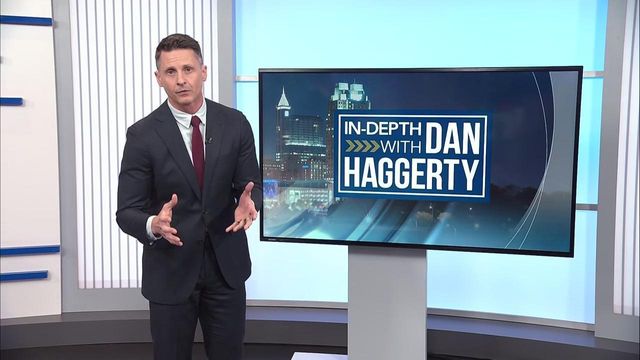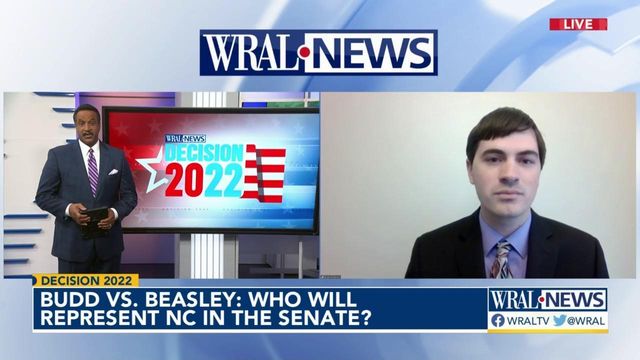NC candidates tiptoed past media, opponents on path to primary victories
U.S. Senate candidates Ted Budd and Cheri Beasley adopted disciplined primary strategies. Several congressional candidates were cautious and relied on outside money.
Posted — UpdatedBudd, Hines, Foushee and others represent a new breed of politician: Candidates who tiptoe around the media, avoid their competitors and lean on outside groups to inform voters. Backed by big outside donors, these calculated and seemingly inaccessible candidates are emerging victorious, sidestepping one of the most basic traditions of campaigning: talking to the public.
“We’re in a very new abnormal at this point,” said Doug Heye, a Republican strategist and former communications director for the Republican National Committee who worked on three successful North Carolina U.S. Senate campaigns.
U.S. Senate candidates adopt disciplined primary strategies
Budd declined repeated interview requests in the final weeks of the campaign, instead choosing to speak directly with voters and outlets that could potentially offer more favorable coverage.
Earlier this month, he said he concluded a tour of all 100 North Carolina counties.
He has since criticized former state Supreme Court Chief Justice Cheri Beasley — his Democratic opponent in the race — for not being similarly active.
Beasley said in an interview on Thursday that she had visited “a lot of counties.”
“It doesn’t matter how many counties Congressman Ted Budd says he visited,” Dory MacMillan, a Beasley campaign spokeswoman, said in a statement. “He clearly isn’t listening to North Carolinians,” referring to his campaign tactics and voting record in the U.S. House.
Beasley and Budd are seeking to portray one another as too extreme ideologically. While Budd is running with the support of Trump, Beasley has appeared to distance herself from President Joe Biden.
Budd’s top campaign adviser, Jonathan Felts, has declined to make the congressman available for WRAL News interviews since mid-March.
“The technology exists where the press can be bypassed if you want to do that,” Felts said, noting that social media and other resources enable Budd to communicate more directly and potentially more widely to potential supporters.
Felts also said it can be difficult for a candidate to have candid conversations with voters. Some attendees could be concerned that a question they might want to ask could be misconstrued by a reporter at an event, he said.
“With this increased megaphone that everybody has, voters want to be able to ask candidates questions without someone judging them for the questions they might be asking,” Felts said. “That could be judgmental in terms of, ‘Oh, they’re gonna say I’m extreme,’ or ‘They’re gonna say I’m heartless’ or ‘They’re gonna think I’m stupid.’”
He added that sometimes people are intimidated by the media. “You guys assume everyone welcomes you with open arms, but honestly, sometimes it hinders the interaction with voters.”
Nonetheless, Budd was able to get his word and his message out there due in large part to gobs of financial support from outside political groups.
Former Gov. Pat McCrory and former U.S. Rep. Mark Walker, Budd’s top primary opponents, frequently criticized him for that.
In his concession speech, McCrory encouraged his supporters to demand “maturity and professionalism.” He said Budd should debate Beasley “because our country deserves it.”
Heye, the GOP strategist, isn’t employed by any of the U.S. Senate campaigns. He thinks skipping debates could also be a sign that campaigns are fearful that their candidate might slip up and create fodder for attack ads.
“They don’t feel the need to do it,” Heye said of Budd’s debating strategy. “Part of it with the debates is, to be honest, people only hear about them if somebody screws up. That’s especially true in primaries.”
Budd hasn’t committed to participating in a general election debate, but he has expressed an openness to it. Beasley said she’d debate Budd.
“It's important for the people here in North Carolina to hear from us,” she said. “I'm looking forward to talking about the kinds of issues we're hearing from people all over the state.”
Congressional candidates display shyness
Asked why he hadn’t been more accessible to reporters in the primary, Hines said his campaign prioritized direct voter contacts and had knocked on more than 15,000 doors.
“We were focused on talking directly with voters,” Hines said of his limited media availability in a Wednesday interview. “I think that voters are sick and tired of the political chattering class attempting to determine the outcome of elections. I think that they want to have a direct say and directly know the candidates themselves. That’s why we’ve done countless meet and greets.”
Hines defeated businessman DeVan Barbour and Daughtry by narrowly surpassing the 30% threshold needed to claim the nomination outright. He got 32% of the vote, while Barbour and Daughtry took in 23% and 17%, respectively.
Unlike many congressional primary winners–and even a few losers—he didn’t hold a public Election Day victory party, the kind of event where press and supporters often gather.
Hines said he intends to be more accessible in the leadup to the general election. He also said he plans to debate state Sen. Wiley Nickel, his Democratic opponent, who has a reputation for being highly accessible to the media.
“If Wiley wants to debate the issues, I'm more than happy to do so,” Hines said. “I think that we have a winning message. I think that our message will resonate with voters. We're going to win this thing in November.”
Foushee criticized for outside influence, limited visibility
Foushee sought the Democratic nomination to fill the seat of retiring U.S. Rep. David Price in the state’s most liberal congressional district. Her top opponents were former “American Idol” star Clay Aiken and Durham County Commissioner Nida Allam, who ran with the backing of U.S. Sens. Bernie Sanders of Vermont and Elizabeth Warren of Massachusetts.
Allam’s campaign criticized Foushee for limiting her availability and not showing up on the campaign trail, noting she declined to attend at least six candidate forums. Television ads from out-of-state groups supporting Foushee allowed her to resonate with voters without having to go through news organizations or traditional debates.
Foushee lost endorsements for not rejecting support from AIPAC, which has previously endorsed Republicans who voted to overturn the results of the 2020 presidential election.
She responded to criticism from Aiken and others with an emailed statement noting AIPAC has supported other prominent Democrats.
The statement said Foushee was “one of dozens of progressive candidates and elected officials…who has received support from AIPAC because of her unequivocal support for a two-state solution in the Middle East and her belief that Israel is a critically important strategic ally—and the only democracy—in the region.”
Related Topics
• Credits
Copyright 2024 by Capitol Broadcasting Company. All rights reserved. This material may not be published, broadcast, rewritten or redistributed.






